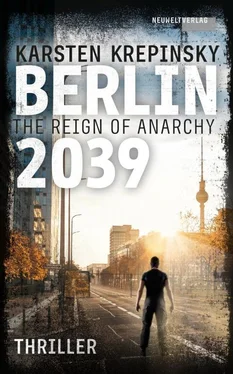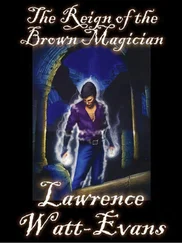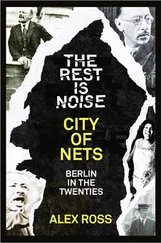Karsten Krepinsky
BERLIN 2039
THE REIGN OF ANARCHY
Translated from the German by Karin Dufner
Dedicated to the freedom of thought
Prenzlauer Berg
Today: a white middle and upper class neighborhood
2039: now P’berg, a gated community behind barbed wire, seemingly a safe haven for civil servants and government officials
Kreuzberg
Today: a bohemian neighborhood, inhabited by students, hipsters, and immigrants with touches of gentrification
2039: now X’berg, a place with a great view of the Ghetto where bored young “Globals” live in expensive penthouses
Friedrichshain
Today: a bohemian neighborhood with a lively nightclub scene
2039: now F’hain, dubbed The Ghetto.
Wedding
Today: a working class and immigrant neighborhood with a few students tossed in the mix
2039: the puffer zone between the rich and the poor population
Wannsee
Today: a very upscale neighborhood
2039: ditto
“We won’t stand idly by while this human trash gnaws its way through the city of Berlin like a cancerous growth. Therefore, I have given order to immediately seal off those areas of the city forever lost to us…”
From the press statement of Chancellor Vasily Schmidt on the
National Emergency Act of August 23, 2036.
The dead man’s cap has come off, his white caftan is soaked with blood. Slumped forward on a chair, his head lies on the kitchen table in a pool of blood. The skull has been smashed, more blood is oozing from a deep wound. Remains of his last meal cling to his full beard. The killer wipes his cudgel on his victim’s robe, kisses the wooden crucifix he is wearing around his neck on a leather thong, and pulls his hood down deeper into his face. He is an apparition, dressed in worn-out shabby clothes. All in gray and covered in the dirt of the streets. His face hidden in the half-shadow of his hood, he pulls a playing card from a fabric pouch secured with a length of rope and crams it between the murdered man’s index and middle fingers. He sits down next to him at the table, pulls the soup plate closer, tears off a piece of pita bread, dunks it into the soup, and starts eating. Rivulets of arterial blood mingle with meat broth. The killer reaches for the glass of black tea, empties it, gets up, and places plate and glass in the sink, which he then stops up and opens the faucet. With a wordless nod he takes one last look at the dead Salafist, as if a score had just been settled. Before he leaves the kitchen, he turns off the light.
The Lemons call all Germans potatoes. Or Jews, if they happen to be in a bad mood. Which they usually are. Especially because F’hain is surrounded by a fence with checkpoints now, effectively blocking their access to the better-off citizens of Berlin. Concrete steles and soldiers, sporting assault rifles. MG nests, sheltered behind walls of sandbags. Those obstacles can really be a challenge, even for a testosterone-controlled kid of the Ghetto. Barriers and checkups remind me of the Holy Land somehow, if you know what I mean. In some places the fence is already being replaced with a wall. An installation that seems to be meant for eternity. Thus, leaving F’hain has become difficult. The high-rises of Alexanderplatz, the posh shopping malls of Potsdamer Platz, or the fancy boutiques of Friedrichstrasse are now out of reach for most people here. And the future doesn’t look rosy. Now and then I can see those poor devils at their windows. The losers of this world, you know what I mean. With all their dreams of happiness and wealth. Them, who spend their evenings standing at the drafty windows of the run-down dumps they live in, because all the violence around stops them from venturing out in the streets. Pasty faces pressed against the glass and eyes filled with yearning, they gaze into the far distance. They breathe the same air as the Globals at Alexanderplatz. They look up to the same sky. But fate has dumped them on the wrong side of the fence. Once Ghetto, always Ghetto.
Once upon a time we had another wall in Berlin—this was fifty years ago. Almost ten years before I was born. Nobody knows about it anymore, because in the Ghetto book-learning doesn’t mean shit. The Quran is the only book that counts. In many areas of F’hain life is ruled by Sharia, Islamic law. The version favored by the Imam , that is. The Quran leaves lots of room for interpretation, you’d better take my word for it, my friends. Even the Lemons themselves constantly bicker about it. Other than the big-shots living in the Wannsee neighborhood would like to believe, they don’t form a monolithic bloc. Far from it: the Turks hate the Arabs, the Kurds hate the Turks, and everyone hates the Chechens. And the Arabs? Who cares who the Arabs hate? I also have no idea why the Muslims are called Lemons . Maybe because of their typically dour faces, as if they’d just bitten down on a lemon. Don’t get me wrong. Germans or Muslims, it doesn’t mean a thing to me. I don’t even look like an Aryan myself. An ex-girlfriend once told me that my features were those of a generic immigrant. Mediterranean type, anything from Turk to Arab, a light-skinned one, that is. Maybe that’s why they picked me for this job. Because, with my dark hair and my Middle-Eastern complexion I almost pass as a Lemon .
I’m not ashamed to say that there also might be a little Jewish blood flowing in my veins. My swarthy looks have to come from somewhere, right? As cute as the idea might sound, it’s not very likely that my great-great-grandmother succumbed to the charms of an Italian migrant laborer, working at the railway tracks in early nineteenth-century Germany. You all know how people tend to romanticize their family backgrounds. Every Tom, Dick, and Harry likes to think of himself as the heir to some blue-blooded name. No, I’m serious. I’m convinced that there must be some Semitic influence. Just regular Jewish blood, coursing through my body. Even though my eyes are blue. That’s something that means a lot to me. I don’t need to resort to colored contact lenses like many Lemons are doing it now. Some of these jokers even dye their hair blond. I guess they hope that it will further their careers. But it’s not easy to get the Ghetto out of your system.
One more thing you need to know about me is, that I’m no fan of organized religion. Opium for the masses, that’s what it is to me. And, God knows, I’m not alone with this view. Plus, I also prefer to be in charge of my own drug supply. I work as a Pusher for the LKA and my job is to adjust the “balance of power” in the neighborhood. This involves evening the scales between the different Godfathers by making sure that the bosses will continue their war against each other: the Tsar , the Imam , the Babo , and the Emperor . If one of them shows signs of getting too much ahead in the game, he needs to be cut down a notch to prevent violence from spilling over Ghetto limits. Human trash is supposed to fight among themselves, right? As the LKA doesn’t like to get their hands dirty they use drug dealers like us. Off the record, of course. When one of the Godfathers gains too much power, it’s our job to give the competition a leg-up with the help of well-placed donations. As you can probably guess pushers aren’t the most popular of people. When we supply his competitors with merchandise, the Imam is sure to hear about it. Still, this system works remarkably well. In the realm of organized crime bosses tend to think like politicians. They, too, form new alliances every day. And an offer of friendship that comes in the guise of a suitcase full of free drugs often has a healing effect.
Читать дальше













